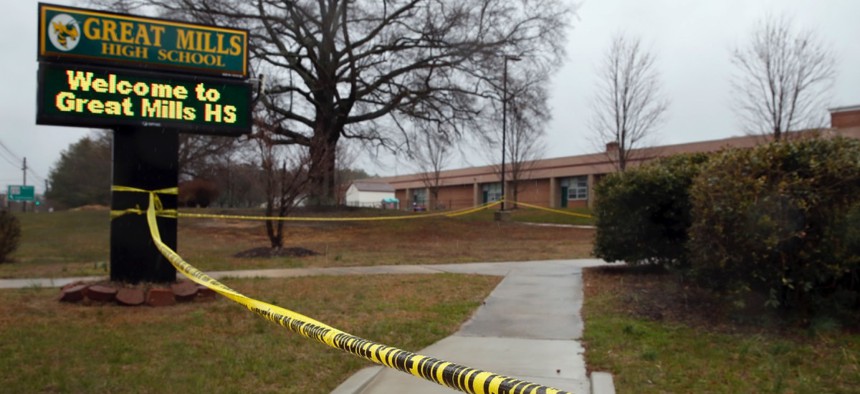The First Step to Safer Schools Is Funding Them

Crime scene tape is used around Great Mills High School, the scene of a shooting, March 20 in Great Mills, Maryland. Alex Brandon / AP Photo

Connecting state and local government leaders
“There’s going to need to be more resources down the road,” according to West Palm Beach, Florida Police Chief Sarah Mooney.
WASHINGTON — To improve school safety, local districts and law enforcement agencies have many priorities to juggle, including hardening soft targets and boosting the numbers of school resource officers, social workers and mental health counselors. And that’s a challenge when funding is limited, according to West Palm Beach, Florida Police Chief Sarah Mooney.
Mooney told U.S. mayors and police chiefs—gathered Monday in the nation’s capital for their Keeping Cities Safe in a Changing Environment meeting—that Florida’s legislature rapidly budgeted $40 million for school safety in Palm Beach County alone following February’s mass shooting at Marjory Stoneman Douglas High School in Parkland, located in neighboring Broward County.
Palm Beach County relies on 150 officers to protect 180 school facilities with 187,000 students. With the $40 million, Mooney said, the county is expected to add 75 officers and other personnel like counselors.
“There’s going to need to be more resources down the road,” she said.
Students’ mental health is collateral damage in school shootings, said Charles Ramsey, a retired police chief who led forces in Philadelphia and Washington, D.C. He urged mayors and police chiefs to advocate for preserving funds dedicated to helping students recover from the psychological effects of school shootings.
“Every time these budgets come out, the first thing people want to cut is counselors, they want to cut social workers, they want to cut school psychologists,” Ramsey said. “They want to cut all these resources that make a difference in schools.”
Ensuring the visibility of uniformed officers on every school campus to deter potential shooters is Palm Beach County’s first priority, Mooney said, but they need to be vetted to ensure they’re willing to be mentors and not simply catch criminals.
Every jurisdiction that supplies school resource officers should determine whether they have the personality to both work with children and take action during an incident, Ramsey said.
“Parkland was a wake-up call,” he said. “You’ve got to pay attention to who the hell it is you’re putting in your schools.”
Palm Beach County is further emphasizing information sharing to intervene when a potential shooter is identified and get them the services they need before they turn to violence. Within two weeks of the Parkland shooting, the county launched a mobile application soliciting anonymous tips from the parents and students about potential threats.
A fusion center in West Palm Beach is also being mobilized to identify threats online and notify the jurisdiction in which the person issuing them lives.
“We need to know how to access our children’s social media accounts,” said Westland, Michigan Police Chief Jeff Jedrusik.
Jedrusik said, in addition to ramping up camera systems and key scans in schools, parents should be taught how to use apps like Facebook, Twitter, Instagram and Snapchat to go through their children’s accounts once a week, and city government can get that information in their hands.
The Council of the Great City Schools was in Palm Beach County last week helping assess schools’ safety and security systems for gaps.
“Training plays a very important role in this,” said Mike Casserly, CGCS executive director. “But so do the specific protocols we use for disciplining kids.”
A lot of schools have fallen in the habit of calling police in for every little incident, Ramsey said.
Minor arguments are leading to serious charges and contributing the the school-to-prison pipeline—particularly in the case of people of color—when that need not be the case.
“We’re giving kids criminal records for relatively minor things,” Ramsey said. “We’ve got to be very sensitive to that because when you say ‘school safety’ and ‘security,’ in the minds of many people, that means more cops and more arrests in a school setting, and that’s just the wrong way to approach this.”
Dave Nyczepir is a News Editor at Government Executive’s Route Fifty and is based in Washington, D.C.

NEXT STORY: To Curb Rising Health Insurance Costs, Some States Try 'Reinsurance Pools'





